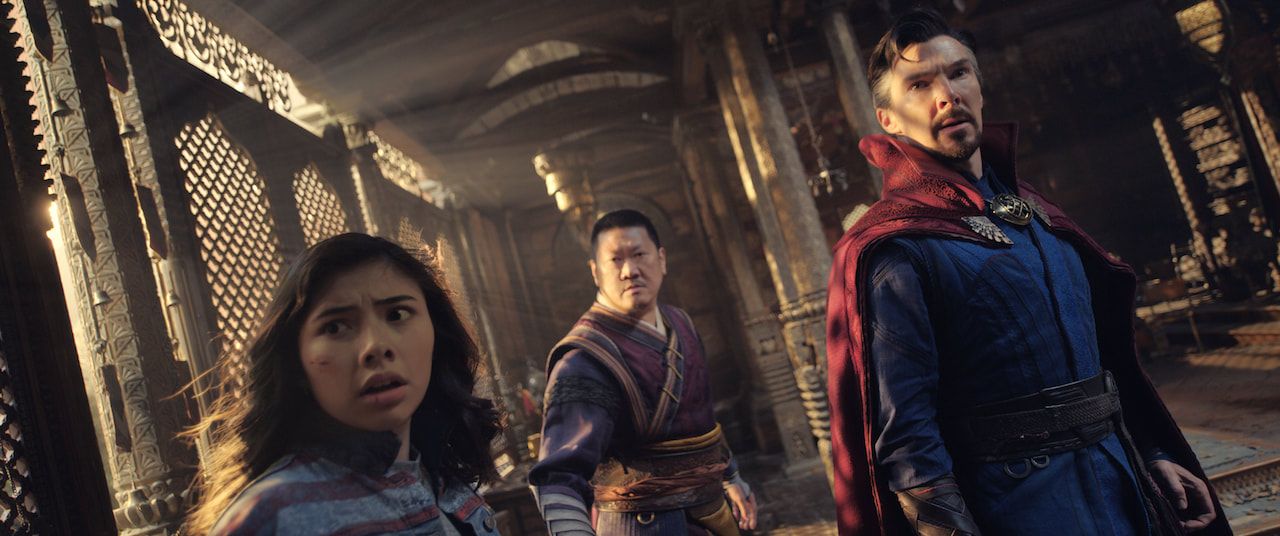Review:
"Doctor Strange in the Multiverse of Madness"

Release Date: May 6, 2022
Rating: PG-13 Running Time: 126 minutes When it comes to hiring directors, Marvel more often than not favors emerging talent and strong voices outside of Hollywood over veteran filmmakers who possess an immediately identifiable signature style. The Kenneth Branaghs and the Shane Blacks are notable exceptions to the rule. So when Doctor Strange director Scott Derrickson walked away from the sequel to his 2016 mindbender over creative differences, few predicted Marvel would recruit Sam Raimi to oversee Doctor Strange in the Multiverse of Madness. He’s a director determined to put his personal stamp on every film he makes. He is not a director one would assume would happily adopt the cookie-cutter approach that is used to push forward a narrative partially constructed to setup the next installment in the Marvel Cinematic Universe. So, to some extent, Raimi contradicts what Marvel wants and needs in a director. But Raimi was one of the directors responsible for putting Marvel on the map with his Spider-Man trilogy of the 2000s. And the maestro of cartoon horror’s off-kilter brand of humor, distinct visual flourishes, fascination with the supernatural, and comic-book sensibilities certainly are in harmony with all that is weird and mysterious about Doctor Strange, the dimensions he traverses, and the adversaries he faces. Which means that Marvel made the right decision to hire an old pro such as Raimi to The Multiverse of Madness instead of the hottest name in indie horror with no experience working with a $200 million budget and who might find themselves overwhelmed by all that comes with taking on a project in flux. The result: an eerie universe-hopping chiller that owes as much to Raimi’s Evil Dead franchise as it does to all that has come before in the MCU. The closet Marvel has come to making a horror film, The Multiverse of Madness features everything we want and expect from Raimi: witches, the undead, corrupted doppelgängers, evil books, hyperactive camerawork, surreal imagery, effective jump scares, hilarious moments of slapstick, an evocative Danny Elfman score, and the inevitable Bruce Campbell cameo. This is Raimi’s Doctor Strange in the Multiverse of Madness without a shadow of a doubt. That said, The Multiverse of Madness is very much the archetypal MCU entry in that it concerns itself with what has come before and what will come next. Less a sequel to Doctor Strange than a continuation of both Spider-Man: No Way Home and the Disney+ series WandaVision, The Multiverse of Madness finds Benedict Cumberbatch’s snarky and snooty sorcerer taking on Elizabeth Olsen’s emotionally traumatized Wanda Maximoff, aka the Scarlet Witch, as the fate of an alternate universe hangs in the balance. This is Civil War fought with magic. The Multiverse of Madness introduces Xochitl Gomez’s America Chavez, whose uncontrolled ability to jump from one universe to another captures the Scarlet Witch’s attention. The Scarlet Witch wants to harness America’s power so she can travel the multiverse in search of an Earth where she can find the happiness she has sought since the death of her beloved Vision. Doctor Strange unites with his mentor, Benedict Wong’s Supreme Sorcerer Wong (Benedict Wong), to protect America in a bid to thwart the Scarlet Witch’s attempt to alter one universe’s reality for her own needs. “I am not a monster …. I am a mother!” Wanda declares early in The Multiverse of Madness. But Wanda’s transformation into the all-powerful and malevolent Scarlet Witch strips her of the understanding and sympathy she engendered by the end of WandaVision. Gone is a woman who create a dream family to offset her grief. In her place is a force of fury determine to steal what she believes is rightfully hers by any means unnecessary. Raimi gleefully allows the bodies to pile up as Olsen unleashes a ferocious rage fueled by the events of WandaVision. Raimi and screenwriter Michael Waldron juxtapose the Scarlet Witch’s search for contentment against Strange’s own state of mind. This often manifests itself in Strange confronting various versions of himself in the multiverse. We know Strange’s powers are as much a curse as they are blessing. But it is his love for Rachel McAdams’ Christine Palmer—a love he knows cannot be acted on for fear of her life—that truly leaves him in pain. Raimi and Waldron further complicate the relationship between Strange and Christine to drive the narrative, which also feeds into the theme of sacrifice that runs through The Multiverse of Madness. With great power comes great sacrifice. McAdams, though, remains as stuck in Cumberbatch’s shadow as she was in Doctor Strange no matter how much The Multiverse of Madness employs Christine to push Strange into self-examination. As plucky as she is as America Chavez, Xochitl Gomez is too often positioned as a damsel in distress. This is partly a function of the teenager not knowing how her powers works, so The Multiverse of Madness is mostly a journey of discovery for her. Also, The Multiverse of Madness barely acknowledges the teenager is a lesbian, which sadly is so very Disney. In contrast, Chiwetel Ejiofor, as former master of the mystic arts and former Strange ally Karl Mordo, effortlessly slides into his new role as antagonist. But The Multiverse of Madness mostly hints at what possibly is to come between Mordo and Strange. Of course, there is much in The Multiverse of Madness that may or may indicate the future direction of both the Doctor Strange franchise and the MCU as a whole. To say more would be to spoil many of the film’s surprises. At the same time, and again without going into any details, The Multiverse of Madness recognizes Marvel’s film and television past in a way that feels both organic and forced. At times, you are left with the sense that The Multiverse of Madness is trying to one-up Spider-Man: No Way Home whenever possible. This, though, feels very much the byproduct of the retooling of The Multiverse of Madness in wake of its COVID-related production delay. Remember, The Multiverse of Madness was scheduled to open in May 2021 in advance of Spider-Man: No Way Home’s original July 2021 release. So when The Multiverse of Madness was pushed to 2022, it needed to be written to reflect the events of Spider-Man: No Way Home. So it is little wonder that The Multiverse of Madness often feels messy and disorganized. But Raimi corrals the resulting chaotic energy to good effect. The Multiverse of Madness may meander but it never runs out of intriguing ideas or outstays its welcome. In years to come, we hold The Multiverse of Madness in regards as we do Raimi’s Spider-Man and Spider-Man 2 today? Probably not. But with The Multiverse of Madness, Raimi proves to his contemporaries that an established director can work within the confines of the MCU while staying true to themselves. Robert Sims Aired: May 5, 2022. Web site: https://www.marvel.com/movies/doctor-strange-in-the-multiverse-of-madness |
|
